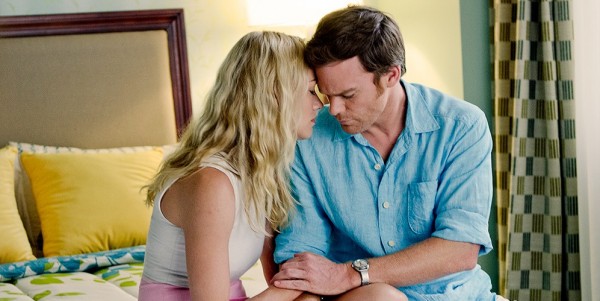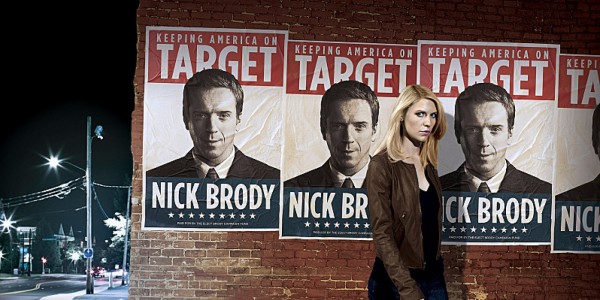Remember when Showtime was the network to watch? When Dexter and Weeds were two of the hottest shows on the air, winning viewers and awards alike? What a difference a few years makes. Compared to where it once stood, the Showtime of today is a weakened shell of its former self, drowning in the increasingly competitive television game. By clinging to its former hits well after their expiration dates, and refusing to allow showrunners full control over their programs (according to reports from Dexter producers), Showtime has set itself up to fail – if it doesn’t act quickly.
One of the biggest compliments that can be paid a show is to say it left you wanting more. Far too often, shows overstay their welcome, bowing out years after they should have. While this happens on many network and cable shows, it has become the status quo for Showtime. Weeds found itself in the weeds by the end of its run, hanging on several seasons past its prime. Likewise, Showtime’s groundbreaking The L Word spiraled out of control in its later years, turning into a show many hate-watched rather than enjoyed.
But, perhaps the worst example of a series overstaying its welcome comes in the form of Dexter. Based on a successful book series, the show started its run to rave reviews and awards buzz. The series closely based its first season on the book series’ first novel, giving the writers a clear path to follow. It worked perfectly, and the show was strong from a creative and production stand point. More importantly for Showtime, it was a clear ratings hit. The show’s second season was strong, but had moments where it appeared the writing staff wasn’t quite sure how to deal with a character as complicated as Dexter. Should he be a hero or villain? Unfortunately, as the years wore on, it would be clear the writers never truly figured out the answer to the important question as the true identity of the show’s central character.

Following the first two seasons, the show hit some incredible highs (John Lithgow’s superb guest run in season four and the great work of season seven), along with incredible lows (season six was one of the worst seasons of any show ever aired on television). When someone mentions to me they are planning on starting Dexter, I recommend they watch the first four seasons and the stop. Granted, they’ll miss some great work in season seven, but no one should have to sit through three bad seasons just to see one good one. And here is one of the major problems with Dexter: Showtime didn’t want it to end, so it allowed the show to continue despite being creatively bankrupt.
Looking back, a myriad of things contributed to Dexter’s fall from television prominence. But chief among them is the role Showtime played in continually extending the life of the series. It’s incredibly difficult to watch a show you love slowly fade into a shell of its former self. Watching capable actors perform in increasingly deteriorating storylines is hard to see. At a certain point, you start wishing the show would just throw in the towel and try to get out with some dignity.
After the fifth, sixth, and seventh seasons of Dexter, Showtime was all too happy to renew the series. Even in the months leading up to the eighth and final season of the show, Showtime refused to fully commit to it being the last season for the series. Yes, huge hits don’t come around too often. But if a network wants to claim quality programing matters to it, it must also have the foresight to put shows out of their misery before they become laughing stocks.

Perhaps Showtime might benefit from taking a page from AMC’s playbook, the network (so far) has been careful about letting showrunners dictate the life of a series, but not pushing for additional seasons purely out of a desire to continue making money. Both Breaking Bad and Mad Men are being allowed to end when they need to, even though both series could, arguably, continue for several additional years with increasingly diminished creative returns. Likewise, HBO has a track record of ending shows when they should (True Blood being the exception, but even that is thankfully ending next summer). Maybe it’s due to Showtime not having as many proven hits as AMC or HBO at the current time, but the network needs to make a change in this area to continue competing with the rising cable networks.
One other troubling piece of news out of the Dexter debacle is the story that Showtime told the series’ writers they weren’t allowed to kill Dexter. According to one of the show’s producers, Showtime informed the writers that Dexter was a brand, and they couldn’t kill him off in the show’s finale. Whether or not the writers ever seriously considered such a route is unknown, but that sort of tampering with the creative vision of a series is incredibly disturbing. By comparison, AMC would never have instructed Vince Gilligan to keep Walter White alive on Breaking Bad. Heck, HBO would never insist that Eric or Bill survive the finale of True Blood, or that Tony Soprano survive The Sopranos.
When networks begin interfering with the creative visions of their showrunners, it jeopardizes the entire creative process. Are there exceptions to this rule? I’m sure there are, particularly when stories might cross certain legal lines. Even with the downward spiral Showtime’s only remaining hit series Homeland is currently caught in, the network should not be allowed to right that fast sinking ship. A series lives and dies in the hands of its writers. A network dictating the direction of a series reeks of fear and a desire to control the story being told, which is not a network's job. Its job is to nurture a show through its early years, lavish it with media attention and do all in its power to ensure it is successful.

The network must believe in the series, and convince critics and audiences to believe in it as well. It is a cheerleader that holds the checkbook, not the coach responsible for drawing up the plays. Some of the most creatively amazing shows had little to no involvement from their networks beyond signing checks (see Breaking Bad and Lost). And, just to hit the point home a bit more, those shows were, on the whole, allowed to end on their own terms in every way – whether the endings were beloved notwithstanding.
As it currently stands, Showtime is a network without a clear direction. I as mentioned above, Homeland is currently caught in a maelstrom of negative critical press, and their highly touted new series Masters of Sex doesn’t appear to be catching on as quickly as the network would like. Despite those worries, Showtime recently announced both series will return next year with new seasons. It looks as if Showtime isn’t worried, even though all signs point to the network continuing with its old methods of allowing shows to continue past their prime and at the expense of their creative vision. Just as I now recommend people not watch the entirety of Dexter, I have recently begun recommending people not watch past Homeland’s first season, as the next two will only disappoint. On this current path, I foresee things only getting worse for Showtime before they get better.